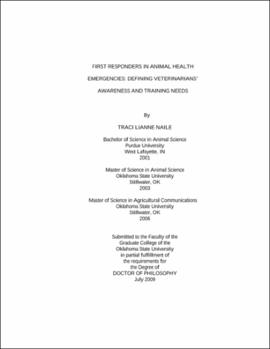| dc.contributor.advisor | Cartmell, D. Dwayne, II | |
| dc.contributor.author | Naile, Traci Lianne | |
| dc.date.accessioned | 2013-11-26T08:22:21Z | |
| dc.date.available | 2013-11-26T08:22:21Z | |
| dc.date.issued | 2009-07 | |
| dc.identifier.uri | https://hdl.handle.net/11244/6568 | |
| dc.description.abstract | Scope and Method of Study: The purpose of this study was to determine veterinarians' self-reported perceptions of susceptibility to and preparedness for responding to emergency events, self-reported knowledge of emergency response and management procedures and communication skills, and areas in which training should be provided to better prepare veterinarians for contributing to emergency management and public health responses. The target population included 1,173 veterinarians licensed in Oklahoma who provided physical practice addresses in Oklahoma, Kansas, Missouri, Texas, and Arkansas to the Oklahoma Board of Veterinary Medical Examiners. All veterinarians in the target population were surveyed using an online questionnaire from April 6, 2009, to May 21, 2009. Veterinarians received a personalized introduction to the survey, followed by two personalized reminders sent on a weekly basis. Nonrespondents received two additional reminders. Data were analyzed and interpreted using descriptive statistics. The final survey response rate was 24.8%. | |
| dc.description.abstract | Findings and Conclusions: Comparisons of demographic characteristics of respondents to previous studies demonstrated additional information is needed to target resources. Respondents reported low levels of experience and training in emergency response on all levels and disease recognition and reporting, with slightly higher levels reported for communication, reflecting a lack of available and targeted training opportunities. Respondents perceived vulnerability to and potential severity of disease outbreaks to be lower on the local levels than on state or national levels, indicating a mindset that outbreaks will not have immediate impact on respondents. Respondents also reported that fewer resources are available on the local level, as well as higher levels of confidence in state and national groups to respond to animal health emergencies. Respondents indicated lower levels of knowledge about and higher confidence in implementing emergency response plans, as well as high needs for training about response plans. Respondents indicated varied levels of knowledge, confidence, and needs for training about disease recognition and reporting and communication skills. The level of influence of cost on respondents' interest in training was neutral to high, and respondents expressed neutral to high levels of interest in training. Moderate to high needs for training were identified for all emergency response plans and 8 of the 10 diseases included in the questionnaire. | |
| dc.format | application/pdf | |
| dc.language | en_US | |
| dc.rights | Copyright is held by the author who has granted the Oklahoma State University Library the non-exclusive right to share this material in its institutional repository. Contact Digital Library Services at lib-dls@okstate.edu or 405-744-9161 for the permission policy on the use, reproduction or distribution of this material. | |
| dc.title | First responders in animal health emergencies: Defining veterinarians' awareness and training needs | |
| dc.contributor.committeeMember | Blackwell, Cindy Southard | |
| dc.contributor.committeeMember | Robinson, J. Shane | |
| dc.contributor.committeeMember | Warde, William D. | |
| osu.filename | Naile_okstate_0664D_10503 | |
| osu.accesstype | Open Access | |
| dc.type.genre | Dissertation | |
| dc.type.material | Text | |
| dc.subject.keywords | agriculture education | |
| thesis.degree.discipline | Agricultural Education | |
| thesis.degree.grantor | Oklahoma State University | |
